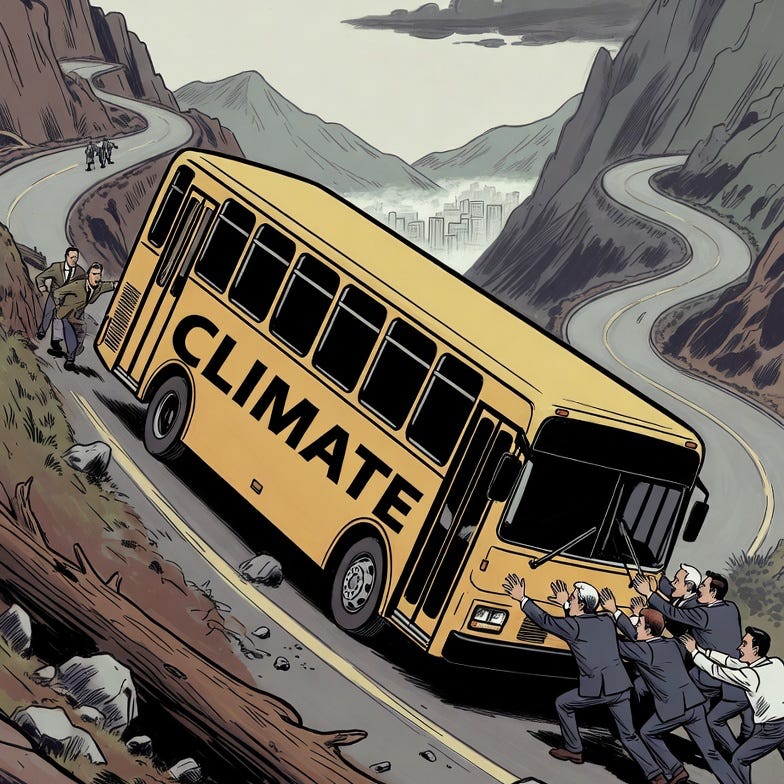10 Things Weekly Roundup - 21st November 2025
Washington’s Expanding Reach and a Week of Global Pressure Points
As the world adjusted to another week of overlapping crises, a recurring pattern emerged: governments set out one vision of their role, yet events dragged them somewhere else. In Washington, an administration elected on an isolationist message spent the week widening its operational footprint - from Venezuela to Sudan and Gaza. In East Asia, diplomatic backchannels continued to thin even as relations deteriorated. Ukraine endured fresh violence and a peace proposal that underlined its shrinking leverage. At home in the US, courts and Congress pushed back against presidential authority. Climate diplomacy stalled in Belém, while carbon credit markets showed the economics of transition hardening. And across the Middle East, regional tensions widened beyond Gaza.
These threads point to a world in which institutions are strained, warning times shortened and the space for quiet diplomacy narrowed.
Despite repeated commitments to pull back from foreign entanglements, the US widened its operational reach this week. A major naval deployment in the Caribbean - the largest in generations - accompanied ongoing strikes that have killed dozens since September. Washington signalled openness to action beyond Venezuela, including potential operations in Mexico and Colombia.
The Gaza plan advanced at the UN further underlined the gap between rhetoric and action: the resolution created an international stabilisation force and a new governance structure, tying any future Palestinian statehood to reform of the Palestinian Authority. Meanwhile, the administration pledged to work to end Sudan’s civil war after a request from regional partners, stating that action began within half an hour.
Taken together, these moves show an administration asserting power on several fronts despite having campaigned on stepping back - a reminder that declared strategic intent and the gravitational pull of crises often diverge.
China maintained steady pressure across its near neighbourhood. Coast guard vessels entered waters around contested islands, drones approached Japanese territory and Taiwan logged dozens of military aircraft operating around the island within a single day. China’s warnings triggered hundreds of thousands of cancelled flights to Japan, with travel disruption outpacing new bookings.
At the same time, Japan’s diplomatic bandwidth shrank. Key political intermediaries who once maintained communication with Beijing have retired, its coalition partner with longstanding links to China has departed government and the new partner has limited China expertise. Chinese reluctance to engage has complicated even routine parliamentary diplomacy.
Meanwhile, it was revealed that the PLA has been rehearsing landing operations using civilian ferries and floating piers, while US assessments warned that blockades could be imposed with little notice. The combination of greater military activity and weaker channels for crisis management leaves the region more exposed to miscalculation.
Ukraine entered the week facing both renewed violence and diplomatic pressure. A major Russian strike killed dozens of civilians in western Ukraine, with hundreds of drones and missiles launched overnight and rescue efforts continuing days later. Additional attacks hit Kharkiv, while sabotage on the Warsaw–Lublin rail line - a vital artery for assistance - was described as unprecedented and professionally executed.
Parallel diplomatic activity underscored Kyiv’s limited room to manoeuvre. A revised peace plan from Washington (drafted without Ukrainian input) proposed large territorial concessions, restrictions on Ukraine’s future armed forces and a rollback of military assistance. Senior Ukrainian figures rejected it as untenable, and European partners warned against terms echoing early-war demands.
The alignment of intensified attacks, disrupted supply lines and a peace proposal requiring major concessions highlights a narrowing landscape in which Ukraine must negotiate from a position of acute pressure.
In the US domestic constraints on executive authority sharpened this week. Congress voted overwhelmingly to compel the Justice Department to release unclassified Epstein files, with only one dissenting vote and bipartisan support in both chambers. The legislation limits the grounds for withholding information and imposes a strict deadline for publication.
In the courts, judges scrutinised federal actions on two fronts. A magistrate found evidence of misconduct in the prosecution of former FBI director James Comey, including misstatements of law to grand jurors and issues around privileged communications. Separate proceedings revealed that a revised indictment had not been shown to the full grand jury.
Meanwhile, a federal judge ordered an end to the National Guard deployment in Washington, D.C., ruling that it infringed the city’s sovereign powers. Although the order is paused pending appeal, the rulings collectively illustrate a week in which institutional checks asserted themselves clearly.
Negotiations in Belém struggled to maintain momentum. Brazil failed to secure an early consensus, and divisions over fossil-fuel language, finance and national plans persisted. More than 30 countries warned they would reject the draft outcome, arguing it lacked the minimum conditions for a credible agreement. Talks were further disrupted by a venue fire, adding pressure as time ran short.
The dispute unfolded against a tightening economic backdrop. Demand for high-quality carbon removal credits surged sharply, driven by the energy needs of AI infrastructure. Long-duration removals — particularly direct air capture and biochar - now face shortages, pushing prices higher and increasing pressure for investment.
India’s delay in filing its updated emissions plan added to the uncertainty, underscoring the divide between emerging economies seeking greater financial support and producers resisting stronger commitments.
Regional volatility intensified on several fronts. Israeli strikes continued in Gaza despite a ceasefire, while attacks in Lebanon killed civilians in a refugee camp. In the West Bank, Human Rights Watch detailed expulsions that it classified as war crimes, and settler arson attacks destroyed property near Bethlehem and Hebron. Israeli officials said their operations targeted imminent threats and condemned extremist settler violence.
Diplomatically, the Trump–MBS meeting signalled a renewed alignment, with discussions spanning nuclear cooperation, AI and investment. Trump said he would approve the sale of advanced fighter aircraft to Saudi Arabia, a move opposed by Israeli officials who warned it could erode their aerial advantage.
Further south Sudan’s war also deepened regional entanglements, with rival factions backed by neighbouring states and natural resources - especially gold - funding continued fighting.
The week’s developments shared a common thread: rising pressure on systems not designed for sustained strain. Whether in East Asia’s narrowing diplomatic space, Ukraine’s constrained options, COP30’s fractured negotiations or the Middle East’s overlapping conflicts, institutions and alliances were repeatedly tested. In the US, courts and Congress highlighted that limits still exist, even amid executive activism.
Although some issues seemed to come to a head this week it seems that across multiple regions, the signals continue to point not to sudden shifts but to an accumulation of pressures shaping the months ahead.














